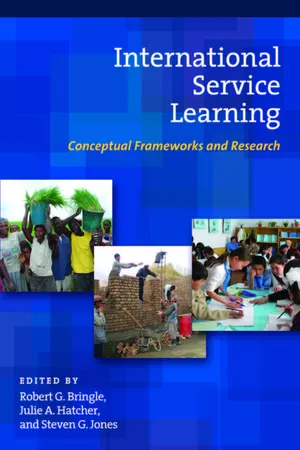
International Service Learning
Conceptual Frameworks and Research
- 416 pages
- English
- ePUB (mobile friendly)
- Available on iOS & Android
International Service Learning
Conceptual Frameworks and Research
About this book
International Service Learning (ISL) borrows from the domains of service learning, study abroad, and international education to create a new pedagogy that adds new and unique value from this combination. It is a high-impact pedagogy with the potential to improve students' academic attainment, contribute to their personal growth, and develop global civic outcomes. The international service experience provides opportunities for additional learning goals, activities, and relationships that are not available in a domestic service learning course or in a traditional study abroad course. The service experience develops reflection while shedding light on and providing an added dimension to the curricular component of the study abroad course. The international education component further broadens students' perspectives by providing opportunities to compare and contrast North American and international perspectives on course content.This book focuses on conducting research on ISL, which includes developing and evaluating hypotheses about ISL outcomes and measuring its impact on students, faculty, and communities. The book argues that rigorous research is essential to improving the quality of ISL's implementation and delivery, and providing the evidence that will lead to wider support and adoption by the academy, funders, and partners. It is intended for both practitioners and scholars, providing guidance and commentary on good practice. The volume provides a pioneering analysis of and understanding of why and under what conditions ISL is an effective pedagogy.Individual chapters discuss conceptual frameworks, research design issues, and measurement strategies related to student learning outcomes; the importance of ISL course and program design; the need for faculty development activities to familiarize faculty with the component pedagogical strategies; the need for resources and collaboration across campus units to develop institutional capacity for ISL; and the role that community constituencies should assume as co-creators of the curriculum, co-educators in the delivery of the curriculum, and co-investigators in the evaluation of and study of ISL. The contributors demonstrate sensitivity to ethical implications of ISL, to issues of power and privilege, to the integrity of partnerships, to reflection, reciprocity, and community benefits
Frequently asked questions
- Essential is ideal for learners and professionals who enjoy exploring a wide range of subjects. Access the Essential Library with 800,000+ trusted titles and best-sellers across business, personal growth, and the humanities. Includes unlimited reading time and Standard Read Aloud voice.
- Complete: Perfect for advanced learners and researchers needing full, unrestricted access. Unlock 1.4M+ books across hundreds of subjects, including academic and specialized titles. The Complete Plan also includes advanced features like Premium Read Aloud and Research Assistant.
Please note we cannot support devices running on iOS 13 and Android 7 or earlier. Learn more about using the app.
Information
Table of contents
- Cover Page
- Title Page
- Copyright Page
- CONTENTS
- PREFACE
- PART ONE: CONCEPTUAL FRAMEWORKS FOR INTERNATIONAL SERVICE LEARNING
- PART TWO: HOW COURSE DESIGN CAN INFORM RESEARCH ON INTERNATIONAL SERVICE LEARNING
- PART THREE: CONDUCTING RESEARCH ON INTERNATIONAL SERVICE LEARNING
- PART FOUR: AN INTERNATIONAL PERSPECTIVE
- ABOUT THE AUTHORS
- INDEX